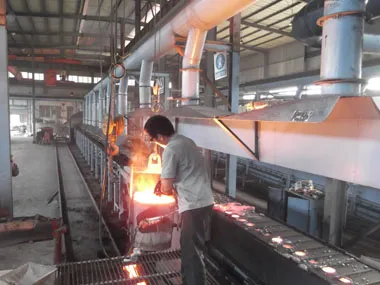Mobile:+86-311-808-126-83
Email:info@ydcastings.com
the two types of centrifugal compressor impellers are
The Two Types of Centrifugal Compressor Impellers
Centrifugal compressors are vital components in various industrial applications, including gas and oil processing, refrigeration, and air conditioning. They operate by converting kinetic energy from a rotating impeller into pressure energy. A crucial aspect of these compressors is the impeller, which is responsible for increasing the velocity of the air or gas that passes through it. There are two primary types of centrifugal compressor impellers the closed impeller and the open impeller. Understanding the differences between these two types is essential for selecting the appropriate design for specific applications.
Closed Impellers
Closed impellers are characterized by their enclosed design, where the blades are situated between two shrouds—an upper and a lower shroud. This design provides several advantages
1. Aerodynamic Efficiency Closed impellers typically offer better aerodynamic efficiency compared to open impellers. The enclosed blades help maintain streamlined flow, reducing turbulence and pressure losses within the compressor. This efficiency makes closed impellers ideal for applications that require high pressure and flow rates.
2. Higher Pressure Ratio The closed design allows for an increased pressure ratio, making these impellers suitable for high-pressure applications. They can compress gases to elevated pressures while maintaining a well-controlled flow.
3. Reduced Contamination The enclosed construction helps prevent contaminants from entering the impeller space, thereby enhancing the longevity and reliability of the compressor. This feature is particularly important in applications that deal with dirty or particulate-laden gases.
However, closed impellers also have some limitations. The complexity of their design can lead to higher manufacturing costs, and they may not be as effective when dealing with fluid mixtures or variable flow conditions. Additionally, the enclosed nature means that closed impellers can be more susceptible to damage from debris.
Open Impellers
the two types of centrifugal compressor impellers are

In contrast to closed impellers, open impellers feature blades that are not shrouded. The blades extend outwards from a central hub, allowing for greater flow passage. Open impellers provide unique advantages, including
1. Simplicity and Cost-Effectiveness The design of open impellers is simpler, which often translates to lower manufacturing costs. This simplicity can also lead to easier maintenance, making them a popular choice for many industrial applications.
2. Handling of Viscous Fluids and Solids Open impellers are well-suited for handling fluids that contain solid particles or have high viscosity. The absence of shrouds means there is less risk of clogging or blockage, allowing these impellers to handle a variety of fluid types effectively.
3. Better Performance at Low Flow Rates Open impellers are often more efficient at lower flow rates compared to closed impellers. This characteristic makes them suitable for applications where the flow demand may fluctuate.
On the downside, open impellers generally have lower aerodynamic efficiency and pressure capability compared to closed impellers. The lack of shrouds can result in increased turbulence and losses, making them less ideal for high-pressure applications.
Application Considerations
Choosing between closed and open impellers depends on the specific requirements of the application. For industries requiring high pressures, such as gas processing or petrochemical applications, closed impellers are often preferred due to their efficiency and pressure capabilities. Conversely, for applications involving slurries, wastewater treatment, or processes where fluid characteristics vary significantly, open impellers may be the better choice.
Conclusion
In summary, the choice between closed and open impellers in centrifugal compressors hinges on the demands of the specific application. Closed impellers offer advantages in efficiency and pressure ratios, making them ideal for high-demand environments, while open impellers provide versatility and cost-effectiveness for handling viscous fluids and solids. Understanding these two types of impellers is essential for engineers and designers to optimize compressor performance and ensure reliability in their industrial processes.
-
Unleash Wholesale with YD's Steel Investment CastingNewsAug.04,2025
-
Revolutionize Your Inventory with High-Quality Impeller SolutionsNewsAug.04,2025
-
Power Your Wholesale Business with Premium Electric Power AccessoriesNewsAug.04,2025
-
Elevate Your Wholesale Business with Premium Valve SolutionsNewsAug.04,2025
-
Elevate Your Wholesale Business with Premier Metal Castings SolutionsNewsAug.04,2025
-
Drive Your Wholesale Success with Premium Auto Water Pump SolutionNewsAug.04,2025











